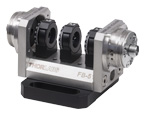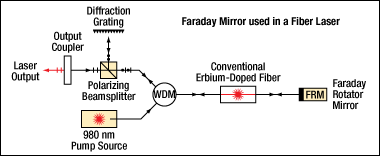
Faraday Mirrors with Fiber Optic Pigtail

- Returns Light at 90° Orthogonal Polarization Relative to Input
- Bismuth Iron Garnet (BIG) Faraday Rotating Element
- 1310 nm and 1550 nm Design Wavelengths
- Unterminated, FC/PC, or FC/APC Versions Available
MFI-1310-APC
Faraday Rotator
(Magnet, Film)
Planar
Mirror
Lens
Internal Schematic
OVERVIEW

Click to Enlarge
Schematic illustrating polarization rotation as light passes through the Faraday rotating element from the fiber input (top) and after reflecting off the mirror (bottom).
Features
- Returns Light with Polarization Rotated 90° Relative to Input
- Bismuth Iron Garnet (BIG) Faraday Rotating Element
- 1310 nm or 1550 nm Center Wavelengths Available
- Available with 2.0 mm Narrow Key FC/PC or FC/APC Connectors or Unterminated Leads
Thorlabs' Faraday Mirrors with a Fiber Optic Pigtail are designed to return light with a 90° orthogonal polarization relative to the input state of polarization (SOP). They allow for greater control over the design of systems such as fiber sensors, erbium-doped fiber amplifiers, and tunable fiber lasers. Faraday mirrors are available with center wavelengths of 1310 nm or 1550 nm. With <0.8 dB insertion loss and >50 dB return loss, these devices provide a high signal-to-noise ratio, which makes them ideal for use in fiber interferometers (see the Applications tab).
Rotation of the polarization state is achieved by passing light through a Faraday rotator (shown in the diagram to the right), which consists of a film of bismuth iron garnet (BIG) that has an external magnetic field applied to it by rare-earth magnets. A single pass through the Faraday rotator causes the polarization state of light to rotate by 45° ± 1°. A planar mirror placed after the Faraday rotator returns light back at the same angle of incidence; light passes through the Faraday rotator a second time and light re-entering the input fiber has a polarization state rotated 90°, or orthogonal, to the input polarization state.
Faraday mirrors additionally provide the ability to minimize alterations to the polarization state induced by thermal and mechanical perturbations in the fiber. This behavior is possible because the light will travel through the same fiber when entering and exiting the Faraday rotator (i.e., the pigtailed single mode fiber). Any perturbations to the polarization state that are caused by the fiber are reversed during the return trip. As such, Faraday rotator mirrors will correctly compensate for SOP changes caused by the fiber without using polarization-maintaining fiber; however, the return polarization will be orthogonal to the input polarization.
These Faraday Rotator Mirrors are pigtailed with 1 m of SMF-28 Ultra single mode fiber, which is mounted in a standard Ø900 µm tight tube buffer with proper strain relief. Versions are available with 2.0 mm narrow key FC/PC or FC/APC connectors; the 1550 nm Faraday rotator is also available unterminated.
Custom models are also available upon request. Contact Thorlabs' Tech Support for more information.
| Fiber Polarization Control Selection Guide | ||||||
|---|---|---|---|---|---|---|
| Polarization Controllers | Linear Polarizers | |||||
 |
 |
 |
 |
 |
 |
 |
| Motorized Fiber Polarization Controllers | Manual Paddle Fiber Polarization Controllers | In-Line Manual Fiber Polarization Controller | Free-Space FiberBench | Faraday Mirrors | In-Line Fiber Polarizers | Polarizing Fiber |
APPLICATIONS

Click to Enlarge
Figure 1: Fiber-based interferometer using Faraday rotators to eliminate unwanted polarization effects.
Applications
Faraday rotators are useful for improving the performance of fiber interferometers, as well as fiber amplifiers and fiber lasers. When a Faraday rotator is placed at the end of a length of single mode fiber, any state of polarization (SOP) perturbations to the polarization state that are caused by the fiber are reversed during the return trip; however, the return polarization is rotated to be 90° orthogonal to the input polarization. This is especially useful in a fiber interferometer, where undesired changes in polarization must be controlled for successful interference. Figure 1 shows an example fiber interferometer setup which uses Faraday mirrors to neutralize undesired polarization effects.
Alternatively, as shown in Figure 2, when light passes through a length of fiber, such as an erbium-doped fiber amplifier, and is reflected by the Faraday mirror, the returning beam has a polarization direction orthogonal to that of the input beam. A polarizer can then be used to separate out the counterpropogating beams. This same principle can also be applied to a fiber laser, as shown in Figure 3.

Click to Enlarge
Figure 2: Fiber-based amplifier using a Faraday rotator to create an input and output beam with orthogonal SOPs.

Click to Enlarge
Figure 3: Fiber laser using a Faraday rotator to create an input and output beam with orthogonal SOPs.
Faraday Mirrors with Fiber Pigtail for 1310 nm
| Item # | Center Wavelength |
Bandwidth | Insertion Lossa,b |
Return Lossa,c |
Faraday Rotationa,d |
Max Power Level |
Fiber Pigtail | Termination |
|---|---|---|---|---|---|---|---|---|
| MFI-1310-FC | 1310 nm | 12 nm | 0.5 dB (Typ.) 0.8 dB (Max) |
>55 dB | 45° ± 1° | <300 mW | 1 m of SMF-28 Ultra | FC/PC |
| MFI-1310-APC | FC/APC |
Part Number | Description | Price | Availability |
|---|---|---|---|
MFI-1310-FC | Inline Faraday Rotator Mirror for 1310 nm, FC/PC Connector | $617.72 | Today |
MFI-1310-APC | Inline Faraday Rotator Mirror for 1310 nm, FC/APC Connector | $630.80 | Today |
Faraday Mirrors with Fiber Pigtail for 1550 nm
| Item # | Center Wavelength |
Bandwidth | Insertion Lossa,b |
Return Lossa,c |
Faraday Rotationa,d |
Max Power Level |
Fiber Pigtail | Termination |
|---|---|---|---|---|---|---|---|---|
| MFI-1550 | 1550 nm | 17 nm | 0.5 dB (Typ.) 0.8 dB (Max) |
>55 dB | 45° ± 1° | <3 W | 1 m of SMF-28 Ultra | No Connectors |
| MFI-1550-FC | <300 mW | FC/PC | ||||||
| MFI-1550-APC | FC/APC |
Part Number | Description | Price | Availability |
|---|---|---|---|
MFI-1550 | Inline Faraday Rotator Mirror for 1550 nm, No Connector | $605.84 | Today |
MFI-1550-FC | Inline Faraday Rotator Mirror for 1550 nm, FC/PC Connector | $617.72 | Today |
MFI-1550-APC | Inline Faraday Rotator Mirror for 1550 nm, FC/APC Connector | $630.80 | Today |
